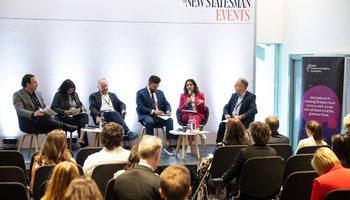
There are few certainties in British politics - especially after a particularly volatile decade - but this is one: a general election will be triggered in 2024. We don’t know exactly when; at the time of writing, an election could happen between April 2024 and January 2025, with many commentators expecting it to be around November, but it is coming.
Another certainty is that an election will bring an array of manifestos. These are the campaigning documents political parties publish telling us what they would do if they were to win the election and form the next government. Given the recent heightened focus on both data and AI, we would expect political parties to be thinking about the data ecosystem and AI more than in any other General Election campaign before this. We can also expect manifestos and vision documents from campaigners and civil society organisations outlining what they want the parties to do.
We were delighted to launch our own recommendations with an event in parliament on Wednesday, 20 March, with the Minister for Data, Julia Lopez MP, and the Shadow Minister for Data, Chris Bryant MP speaking on a panel alongside other senior Parliamentarians. We launched a short executive summary version of our policy manifesto at the event and are now happy to share a longer document with further detail that sets out our key policy asks and why we believe they are important.
Read the policy manifesto in full
It isn’t certain, but we expect greater emphasis on data, digital, and technology. This is for several reasons, including the rapid development of AI, scandals around data-enabled decisions and technology—such as Post Office Horizon—government activity such as the Data Protection and Digital Information Bill and AI White Paper, and the increasing realisation that we live in a data-dominated world— that politics still has the power to shape.
We’ve organised our policy asks under the six principles of our strategy. The headlines are:
Principle 1 - Strong data infrastructure
- We want to see a legislative and regulatory regime that is fit for the future and has people and society, as well as the economy, at its heart
- We need improved data infrastructure for solving key societal and governmental challenges
- Rolling out Smart Data schemes further will benefit consumers
- We need better collection, maintenance, and use of data for better public services and public servants, backed by minimum standards and funding, for local as well as central government
Principle 2 - The best possible foundation for data infrastructure is open data
- A clear and refreshed government strategy around open data or data availability is needed, making data findable, accessible, interoperable and usable
Principle 3 - There needs to be trust
- We want a more participatory data future - open to people, communities, civic society and organisations of all kinds and one where people are empowered to play an active role in the data ecosystem
- Reforms to the Data Protection Bill are needed to create a more trustworthy legislative regime
- Investing in data assurance to enable trusted and trustworthy data practices
Principle 4 - Trusted, independent organisations
- Strategic and long-term funds must be established to support civil society organisations working to ensure we all benefit from the use of data and scrutinise and challenge the use of data (including in AI)
- We want to see a clear commitment to including diverse civil society voices in data and AI decision-making
Principle 5 - A diverse, equitable and inclusive data ecosystem
- Ensuring equitable access to data is essential forgrowth and innovation purposes
- There needs to be greater researcher access to data from (eg) social media platforms
- There must be reforms to the Data Protection and Digital Information Bill which will help foster a diverse, equitable and inclusive data ecosystem
Principle 6 - Data knowledge and skills
- There’s an urgent need for greater data literacy among leaders, including in business, politics and the public sector
- Data literacy among the public needs to urgently increase.
To inform our manifesto, we organised a couple of online workshops with ODI members who we would like to thank for their valuable contributions. We were pleased to see lots of agreement with the points we’d highlighted but also struck by some key themes that emerged across several discussions. These included the use of data in the housing and planning system – a reminder of how better use of data can lead to better outcomes in particular policy areas – and the importance of thinking about data in local authorities as well as central government.
In the weeks and potentially months after today - depending on when the General Election is called - we will be building on the ODI’s policy manifesto by continuing our engagement with parliamentarians and policymakers and setting out why our policy recommendations are so important - for people, for businesses, for society, and us as a country. We hope political parties will take our suggestions seriously as they think about their post-election plans. But we also want our manifesto to prompt broader discussion, as politicians, the private sector and the public navigate an increasingly data-dominated world.
What did the MPs think?
Julia Lopez
"The ODI is a very important organisation in bringing attention to issues around data – there is still insufficient awareness of their importance - I'm very grateful for the manifesto."
Chris Bryant
"The ODI have done a really good job bringing forward a manifesto which lays out the route to a much better system in the UK where you have trust in data and a national regime that allows you to succeed."
Daisy Cooper
"Data infrastructure, data policy, building trust, data trusts are all really important. The ODI manifesto is absolutely spot on."
Damian Collins
"Congratulations on the manifesto, an excellent piece of work as there are so many issues converge around the use of data. Lots of citizens are concerned about how their data is used – and the public sector could be much more efficient about how it uses data and transform the way it operates."
Harriet Harman
"Thanks to the ODI and your increasingly important work – we need hand holding as issues around data become more urgent. I strongly support the ODI's guiding principles - every single one of them underpin and reinforce our need to make sure that we end discrimination from AI and datasets. That's what's going to make it trusted, that's what's going to make it work properly..."
Thank you
Thank you to the 47 people who attended our policy manifesto events, and fed into the policy recommendations in this document. We’d like to acknowledge the organisations who contributed and are happy to be named publicly: BenevolentAI; Global Trade Policy Initiatives; Planning Portal; Clear Channel International; Ivity; civic-systems; Digital Isle of Man; Royal Geographical Society (with IBG); Open Society Institute; NetTek; Axolotl Associates.


